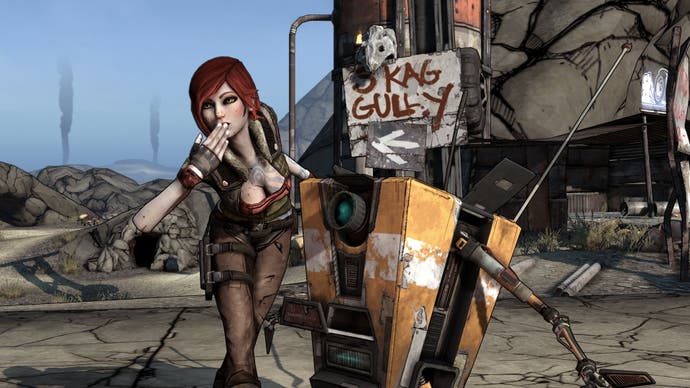Games of 2009: Borderlands
In love with Pandora.
Just to recap: roughly 30 years have passed since the days of Pong, and people are pretty good at making videogames by this point. Genuine twitching abominations are on the decline - rather handily, for a while, they all had Gamecock written on the box - and even the most mundane title will generally have a few ideas worth admiring lurking somewhere within it.
All of which makes it more important than ever to pick your way through the annual mass of the merely commendable to find that handful of magical games that you genuinely fall in love with. These aren't the best titles, necessarily, but they're your favourites all the same: the ones that seem to speak directly to you, reminding you why you spend so much time jabbing at buttons and downloading patches, why you drink all that Dr Pepper sitting alone in a darkened room, why you count a 15-year-old from Wichita who goes by the name of TheLittlestMofo666 and is really good at raising quackberries amongst your closest friends, and why you named your first-born child Birdo.
These games are different for everybody, of course. In 2009, for me it's been Borderlands, Gearbox's white-trash munitions eruption. Borderlands is rough around the edges, certainly - the menus can be fiddly, item management needs a bit of getting used to, the ending (spoilers) is rubbish, and the frame-rate occasionally takes a shoeing - but picking it all apart for the details it inevitably bodges only proves that the details alone don't always matter.
On the back of the box, Gearbox's game may be a full-on collision between RPGs and FPS games that leaves headshots and stat-tweaks littered all over the blacktop, but for me, in a highly subjective manner, it's something far more involving too. It's a study of what is - and what isn't - important in a game's design.

And so colour is dialed up, unnecessary detail is dialed down. Story is as sketched-in as the crosshatching shadows on the distant mountains, while character is rich, babbling, and everywhere to be seen. Cut-scenes are virtually non-existent, but, if you want it, each quest comes with a chirpy sprawl of joke-laden text to enjoy instead. Morality, Ayn Rand and social commentary have all pretty much taken a hike, replaced with a clanky little robot who tends to break-dance when you least expect it. I'm not saying this is perfect for everyone, obviously, but I'm pretty happy with it.
On top of the broader trends, it's also worth noting that for every specific element that needs more polish, there's two or three little things Borderlands quietly nails, too: things like loot drops that don't vanish while you're hunting around for a Double Decker, and battle trucks you can customise with a hot pink paintjob before backing over the mutated wildlife.
And, even before you take into account the truly transformative powers of co-op, there's stuff like Second Wind, the down-but-not-out mechanic that turns getting killed into a resurrection mini-game, providing endless opportunities for sudden changes of fortune, amazing flukes, or the unbeatable sensation that you may have just gotten away with something. You know, the kind of moments that people who play games are likely to actually remember.
The real appeal for me, though, comes down to the magical mixture of mindlessness and generosity at the centre of it all. Borderlands acknowledges the fact that the real narrative of a lot of RPGs isn't the ancient blight you defeat, the storied lands you free from corrupt bullies, and the mystic amulet you painstakingly piece back together huddled in the caverns of Primarche at the foot of Mount Woolworths, but rather the stuff that you find along the way - the loot, the swag, the potions and trinkets.








